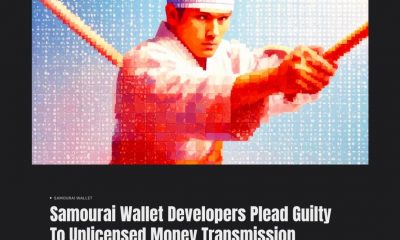

De-fi
Tornado Cash Trial Now in Jury’s Hands as Legal Battle Over Crypto Privacy Tool Nears End – Crypto News
After two weeks of heated testimony and debate, the case against Roman Storm now rests with a jury.
More than two weeks after opening statements in the federal trial of Roman Storm – a software developer and co-creator of the crypto privacy tool Tornado Cash – the jury is currently deliberating in a case that could shape the legal future of decentralized finance (DeFi).
The trial, unfolding in the Southern District of New York, focuses on Storm and his co-founder, Roman Semenov, who was added to the U.S. sanctions list in August 2023 and remains at large. Prosecutors allege the two knowingly enabled money laundering through Tornado Cash, even as they publicly promoted it as a privacy tool.
Storm faces three federal conspiracy charges: conspiracy to commit money laundering, conspiracy to violate the International Emergency Economic Powers Act (IEEPA) through sanctions violations, and conspiracy to operate an unlicensed money transmitting business. If convicted on all counts, he could face up to 45 years in prison.
The case could have sweeping consequences for how U.S. law treats decentralized technology. Some developers and legal experts worry that if Storm is found guilty for simply writing code, it could make it risky for others to build open-source tools, especially those focusing on privacy.
Money Laundering Claims
According to the indictment, the federal government alleges that a large portion of the funds moving through the platform came from illegal activity, and the founders were aware of it.
Prosecutors also assert that Tornado Cash was used to launder over $1 billion, including hundreds of millions linked to Lazarus Group, a North Korean hacking organization under U.S. sanctions. The Office of Foreign Assets Control (OFAC) sanctioned Tornado Cash in August 2022, and the Department of Justice announced the indictment against Storm and Semenov in August 2023.
“The defendants in fact knew that it was a haven for criminals to engage in large-scale money laundering and sanctions evasion,” the document reads. “Indeed, as the defendants well knew, a substantial portion of the funds the Tornado Cash service processed were criminal proceeds passed through the Tornado Cash service for purposes of concealment.”
During the trial, prosecutors emphasized these allegations and also focused on personal stories to make their case. Among them was a woman from Georgia who claimed to have lost around $250,000 in a pig-butchering scam.
No Control Over Software
The defense argues that Storm created software, not a criminal enterprise, and that he had no operational control over how others used it. They emphasized that Tornado Cash was a non-custodial tool and Storm had no means to stop malicious actors from using it.
They told the jury that Storm never intended for hackers to exploit Tornado Cash, emphasizing that the protocol was designed to help everyday people send and receive money privately. They also presented messages between Storm and Semenov that revealed how upset Storm was upon learning that criminals were exploiting the platform.
Divided Opinions
Legal observers are divided. Some argue a conviction could chill open-source innovation, while others say developers must be accountable when their tools facilitate crime.
“ The precedent being set here could ultimately be used to prosecute open source software developers for the use of their tools,” said crypto reporter David Morris on the “11AM” podcast. Morris also likened the situation to gun manufacturers, who are not held legally liable for crimes committed by gun owners.
Meanwhile, Dave Craige, a partner at Studio Capital, retorted on X, “I’m sorry but that is incorrect. He built a money laundering crypto mixer. There were 8 before him. ALL have been illegal. ALL have been involved in money laundering. ALL of the devs have gone to court/jail.”
What now?
Closing arguments took place earlier this week, with prosecutors and defense attorneys each speaking for about 90 minutes. The government then gave a 45-minute rebuttal before the jury began deliberations.
There is no time limit for U.S. jury deliberations — they can last hours, days, or even weeks.
Storm remains out on a $2 million bail, under 24-hour electronic monitoring and travel restrictions.
-

 Technology5 days ago
Technology5 days agoBest 5G phones under ₹10,000 in July 2025: Infinix Hot 60, Samsung M06 and more – Crypto News
-
others1 week ago
Ex‑FSL Leader Launches TrendsDotFun to Tokenize Social Media Posts – Crypto News
-
Cryptocurrency1 week ago
Scaling the Future: Bitcoin.ℏ’s 10,000 TPS Advantage with Hedera Hashgraph – Crypto News
-

 Cryptocurrency1 week ago
Cryptocurrency1 week agoETH to Lead BTC Over Next 6 Months, Says Galaxy CEO – Crypto News
-

 Cryptocurrency1 week ago
Cryptocurrency1 week agoMassive Polkadot (DOT) Rally Ahead? Here’s What’s Driving It – Crypto News
-
Technology7 days ago
Why is Shiba Inu Price Up Today? – Crypto News
-
others6 days ago
Japan CFTC JPY NC Net Positions rose from previous ¥103.6K to ¥106.6K – Crypto News
-

 Blockchain5 days ago
Blockchain5 days agoTether Gold (XAUt) Market Cap Soars as Gold Hits Record Highs in 2025 – Crypto News
-

 others7 days ago
others7 days agoArthur Hayes-Backed Altcoin Outpaces Crypto Market Amid Launch of New Partnership With Anchorage Digital – Crypto News
-

 Cryptocurrency1 week ago
Cryptocurrency1 week agoETH to Lead BTC Over Next 6 Months, Says Galaxy CEO – Crypto News
-

 De-fi1 week ago
De-fi1 week agoStablecoin Flows are Directly Impacting Treasury Yields: Messari – Crypto News
-

 Cryptocurrency1 week ago
Cryptocurrency1 week agoBitcoin Cash up 7% as bulls defy BTC dump, eye gains on rising volume – Crypto News
-

 others1 week ago
others1 week agoUS Dollar finds support amid Fed uncertainty and tariff talks – Crypto News
-

 Technology1 week ago
Technology1 week ago‘Screwed up’: Sam Altman warns against using ChatGPT as your lawyer or therapist – Crypto News
-

 Technology5 days ago
Technology5 days agoWho is Shengjia Zhao? ChatGPT co-creator named Chief Scientist at Meta’s Superintelligence Labs – Crypto News
-

 Cryptocurrency5 days ago
Cryptocurrency5 days agoMarket update: Bitcoin rises after US-EU announce framework trade agreement – Crypto News
-

 Cryptocurrency5 days ago
Cryptocurrency5 days agoBitcoin and Ethereum ETFs Pull in Record-High $11.2 Billion in July – Crypto News
-

 Cryptocurrency1 week ago
Cryptocurrency1 week agoDenver Pastor, Wife Indicted in Alleged $3.4 Million Crypto Scam – Crypto News
-

 Cryptocurrency1 week ago
Cryptocurrency1 week agoFriday charts: Crazy train investing – Crypto News
-

 De-fi1 week ago
De-fi1 week agoWindtree Therapeutics Plans $520 Million Raise, 99% for BNB, Secures $500M Equity Line, Uses Kraken Custody – Crypto News
-
Business7 days ago
Buy DexScreener Reactions – Boost Legends: Guide + $5 Bonus – Crypto News
-

 De-fi5 days ago
De-fi5 days agoETH Unstaking Queue Hits Record High, Led by Justin Sun-Linked Addresses – Crypto News
-
others5 days ago
‘Sit Tight With Bitcoin’ Robert Kiyosaki Predicts Great Depression 2.0 – Crypto News
-
Business5 days ago
Ethereum Breaks $3,900 as SharpLink Makes Another $295M ETH Purchase – Crypto News
-
Business5 days ago
Breaking: US SEC Delays Launch Of Truth Social’s Bitcoin ETF And Grayscale’s Solana ETF – Crypto News
-

 Metaverse3 days ago
Metaverse3 days agoOpenAI rolls out ‘Study Mode’ in ChatGPT: What is it? How to use? All your questions answered… – Crypto News
-
Business1 week ago
Why is PENGU Price up today? – Crypto News
-
Business1 week ago
Crypto Market Crashes Amid Trump’s Threat to Increase Tariffs – Crypto News
-

 Blockchain1 week ago
Blockchain1 week agoBNY, Goldman Launch Blockchain Solution – Crypto News
-

 De-fi1 week ago
De-fi1 week agoGoldman Sachs, BNY to Launch Tokenized Money Market Fund – Crypto News
-

 Metaverse1 week ago
Metaverse1 week agoHow AI can weave a future for Kashmir’s centuries old carpet industry – Crypto News
-

 Cryptocurrency1 week ago
Cryptocurrency1 week agoTea App That Claimed to Protect Women Exposes 72,000 IDs in Epic Security Fail – Crypto News
-

 Cryptocurrency5 days ago
Cryptocurrency5 days agoZK breakthroughs, onchain comebacks and stablecoin shakeups – Crypto News
-
Technology5 days ago
Solayer Launches USDC-Powered Hotel Booking Platform To Give Crypto Travel a Boost – Crypto News
-

 Technology3 days ago
Technology3 days agoSpotify hits 276M subscribers and strong user growth in Q2, but revenue and profit fall short of targets – Crypto News
-

 others1 week ago
others1 week agoUSD/INR refreshes monthly high on relentless FIIs sell-off in Indian equities – Crypto News
-

 Technology6 days ago
Technology6 days agoIndias startup wave merges AI with tradition for smarter daily solutions – Crypto News
-

 De-fi6 days ago
De-fi6 days agoBank of America Says U.S. Lenders Ready Stablecoin Launches – Crypto News
-
Technology5 days ago
Just In: $111B Brokerage Giant Interactive Brokers Explores Stablecoin for Funding – Crypto News
-

 others4 days ago
others4 days agoEUR/USD dives as the US Dollar outperforms with all eyes on the Fed decision – Crypto News
-
others4 days ago
Breaking: PayPal to Let Merchants Accept Payments in Over 100 Cryptocurrencies – Crypto News
-

 others3 days ago
others3 days agoBlockchain Gaming Is Growing Up – What’s Behind the Sector’s Quiet Comeback – Crypto News
-

 Technology2 days ago
Technology2 days agoIs AI causing tech worker layoffs? Thats what CEOs suggest, but the reality is complicated – Crypto News
-

 Blockchain2 days ago
Blockchain2 days agoSEC Crypto ETFs Ruling Brings Structural Fix, Not Retail Shakeup – Crypto News
-

 De-fi1 week ago
De-fi1 week agoAavegotchi Holders Push Back Against $3.2 Million Buyout Bid from Chinese VC – Crypto News
-

 Cryptocurrency1 week ago
Cryptocurrency1 week agoHow to Invest in Cryptocurrency In India – Crypto News
-
Business1 week ago
Breaking: White House To Release Crypto Policy Report On July 30 – Crypto News
-
others1 week ago
Court Approves $1.9B Reserve Release, Enabling Next FTX Distribution – Crypto News
-
Business1 week ago
Elon Musk’s Tesla Reports $284 Million Gain On Bitcoin Holdings – Crypto News
-

 Cryptocurrency1 week ago
Cryptocurrency1 week agoNasdaq-listed Wellgistics Health adopts XRP Ledger for real-time payments – Crypto News
















